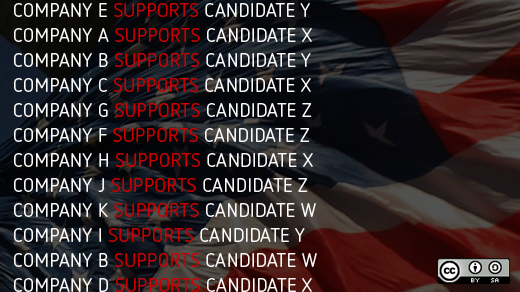America held its first billion-dollar political race in 2008 – DVR use soared (no surprise there). A new lineup of over-produced ads and under-researched hit pieces have yet to hit primetime, and accountability advocates are already worried about November. They are concerned with the potential effect of Citizens United v. FEC: a recent Supreme Court decision holding it unconstitutional to cap corporate spending on behalf of or against candidates.
I’ll spare you their 57-page argument that corporations are Americans too (apparently) and spending is speech. But the result left President Obama, congressional leaders, and states a little shaken, grasping for any fix shy of amending the First Amendment (and Sen. Kerry signaled that option is on the table). Out of that scramble has come Sen. Schumer’s DISCLOSE Act.
The DISCLOSE Act does two things right: (1) it cuts a better-than-usual Washington acronym from “Democracy Is Strengthened by Casting Light On Spending in Elections”; and (2) it recognizes the power of on-air ownership of the “I’m Jane Smith, and I approve this message” variety. The idea is to keep BigCo. subsidiaries with nice sounding names ("Americans for America") from airing a stream of crushing ads while obscuring what entity is really behind the attack. Candidates would quickly learn to think twice before criticising BigCo. practices. The current bill requires subsidiaries to reveal their primary source of funding via an audible disclosure by the corporate CEO sponsoring an ad.
When and if the Senate passes the bill tomorrow (likely their last chance before the November elections), it will still need to be reconciled with the House version, then kicked to the Federal Elections Commission (FEC) for interpretation and enforcement. Good news: there’s time to coax this bill into an achievement beyond a few bureaucratic hurdles that will probably re-employ some of my lawyer friends.
On-air disclosures are valuable, but Congress and the FEC are missing an opportunity if the information is not consolidated in a useful way. With hundreds of federal races across the country (and thousands of state races), real accountability requires that citizens view the big picture. And the web is the best place to achieve that purpose. Open data principles are a helpful launch-point.
For instance, we could use transparency.gov as a comprehensive hub for info spanning corporate election efforts and lobbying activities. The government already collects information on corporate lobbying, and the Obama Administration has made public access to data a high priority. Picture a one-page stop for all corporate electioneering and lobbying efforts, including lists of supported or opposed candidates. Think Transparency.gov/BigCo. This is the kind of open data strategy that could really put meat on the DISCLOSE Act bones.
Government efforts to protect democratic processes should focus on opportunities for transparency made uniquely possible by the web. This isn't about crafting a “gotcha” policy; it's about furthering the exchange of ideas during campaigns via a heavy dose of transparency. In that effort, Congress and the FEC have useful allies from among open government and open data communities. Some have already begun to tackle this issue: Sunlight Foundation, OpenCongress, Open Secrets, among others.
Corporations may have secured a right to uninhibited electioneering, but current technologies and open data practices can allow us to retain some rights of our own.







1 Comment